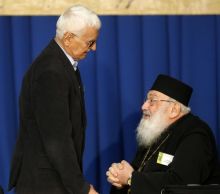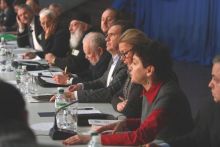Continued from the previous issue
His Beatitude Liubomyr HUZAR, member of the initiative group, stressed the need of realization of such concepts as “free person” and “personal freedom,” because an individual cannot be perfect without them. Huzar thinks historical preconditions are the main reason of today’s state of our society. “The history of the last five generations is very illustrative of Ukrainian’s attitude towards freedom. In the 16th and 17th centuries, people actively fought for freedom. The notion of Cossacks is tightly related to the one of serfdom. People ran away from slavery and created free communities. It was their response to persecutions. The same applies to the Organization of Ukrainian Nationalists, which was created in response to occupation and was later transformed into the Ukrainian Insurgent Army. These examples are representative: both emerged as a reaction to persecution.” At the end, the member of “December 1 Group” summed up: “Today, we are an independent country, but we have not yet comprehended what freedom is. We have to realize what freedom is, understand its importance, and start looking for ways of obtaining the freedom of spirit. The society’s liberation must happen through creation of an environment, in which everyone will have their rights and development abilities satisfied, and also through creation of a specific upbringing and education program.”
Myroslav POPOVYCH, director of the Hryhorii Skovoroda Institute of Philosophy at the National Academy of Sciences of Ukraine, also emphasized the importance of historical heritage. “I want to draw attention to the fact that all countries that were freed from totalitarianism, still run on the Stalin pattern of government. However, it is not the socialist element that is inherited (free education and health care), but tyranny. The re-creation of tyrannical paradigm is taking place. We also see the movement towards the one-party system, since it is the most primitive and, at the same time, the most effective way of establishment of tyranny over spirit. There is no force that can make a society become democratic. This is solely a matter of people’s will.”
Historian Volodymyr Viatrovych noted the destructive influence of Stalinization as well. “The stoppage of de-Stalinization turned into the Stalinization of Ukraine. And not only of Ukraine’s past, but of its present too. The monument to Stalin, erected in 2010, became a precursor of freedom suppression and political witch-hunting in our country.” It should also be noted that Larysa Ivshyna, The Day’s editor-in-chief, also touched upon the topic of Stalinization in her speech (see the rest of the article for quotes from the speech). She also stressed the need for broad historical self-education. This quote was published on Viatrovych’s Facebook page, and it provoked an interesting discussion. The majority sees this need as a vital one. The participants in the discussion think that excellent knowledge of history, riddance of “historical rubbish” and of the “mess in people’s heads” will have a positive influence on establishment and further development of Ukrainian state and formation of the Ukrainian nation.
COMMENTARY
Larysa IVSHYNA, The Day’s editor-in-chief:
“Every person can borrow certain directions from this charter that they agree to, and think over them. All of them are important, but I want to concentrate on just one thought, expressed in the charter: one of the most important tasks of a free person is to think independently. I wanted to offer people to ponder over why we have so many examples in our history, when on the way to freedom, we got ourselves into an even bigger yoke than the one we were running from. As an example, we can recall the recent events of 2004 and what followed. Also, many journalists focused their attention on the events in Georgia. And they succeeded. This success was not long-lasting, but a question emerges: why? There are many answers to it, but I want to emphasize an important moment: leaders’ enlightenment. The national memory preserved this simple truth in a saying ‘There was no Hetman from Bohdan to Ivan.’ It is not only about them being great warriors, Bohdan Khmelnytsky and Ivan Mazepa were also extremely well-educated people at that time. In general, when Ukraine restored its independence, the value of quality education was underestimated. Now it is coming back, because we live in a competitive world.
“We can also think of an example related to the Holodomor memorial days. A lot of people talk about this catastrophe as one of our problems, but it is not included into calculation basis, which we can rely on when saying that starting from the independence restoration, Ukraine was unevenly destroyed and unevenly saved. This roundtable is an attempt to unite all that survived in Ukraine in different areas, especially in business and those spheres that never troubled themselves with such problems. In general, people started thinking about some global humanitarian problems not so long ago.
“One of the examples that prove my point is the statement made by one of Ukraine’s vice premiers, member of the incumbent government, who would raise questions which were not typical for the representatives of the current regime. He used to say that while Russian writers were imprisoned and thrown in gulags, their Ukrainian were colleagues were praising Stalin. The first reaction that comes to mind is that this person knows nothing about Ukraine, but on the other hand, the truth had not been that easy to access until recently.
“Everything that related to fight and resistance of many well-known political prisoners (Ukraine had the most of them among all the countries of the Soviet Union), has not become something that made Ukrainian people look at themselves with great pride. It would be possible to convince people with interesting facts, publications, programs, documentaries. However, today information is not that crucial compound which decides everything. There are a lot of people who have access to all sorts of information but are incapable of making moral conclusions. They can be told about crimes against Ukrainians in the 20th century, but they are not ready to accept it. An atmosphere has to be created, moral leaders need full support of all the tools available within the society to pressurize the environment. I am sure that this is the best option, but if we do not have the country we would like to have (and this is our joint desert), we can do all we can.
“The problems that the country has been facing lately make us learn what solidarity is. For example, the recent rallies in defense of the Pavlychenko family showed that the society is ready for search of a new type of leaders. It is not satisfied with the opposition anymore for a number of reasons. I think that is because we do not see a clear answer, and the opposition does not possess the concept of the modern world that we would like them to have. For the most part, it is busy with wars for power. The situation in Pervomaisk and Arkadii Kornatsky’s speech showed the kind of people the society needs to pay attention to. These are the people who have their own worldview experience and who joined the fight for their and common human rights. They are active, they have their own credibility record, and people look up to them for moral authority.
“Is it worth mentioning that we are helpless in information space? In my opinion, it is better to take some instrumental steps – for instance, like those we have been taking in our newspaper for over 15 years. First, people need an extensive historical self-education. I have on several occasions suggested creating such a valuable thing as the list of literature. We come from various Ukrainian worlds, with various legacies, and it would be good to come up with an individual hit parade of top-10 books which wise people suggest reading now, so man has something to rely on in the today’s world of fastfood information. An example can be seen in this year’s edition of “Armor-Piercing Political Writing.” It took me long before I read Shevelov’s “Moscow, Maroseika.” Many people after reading this article said that it is very interesting.
“Shevelov is known to cite three Ukrainian problems: Moscow, Kochubei’s legacy, and provincialism. I would like to dwell on his definition of the first problem. For us, Moscow still remains not merely a foreign problem, but a domestic issue. After so many centuries, we Ukrainians are still unable to decide what we would like to be: an empire, not quite extinguished, or a republic. This may seem a little too far-fetched, but when we were discussing the book Syla miakoho znaka (The Power of the Soft Sign) or the recent production of Kulish’s play Myna Mazailo in Kyiv and Donetsk, people often came up with the question, ‘Why have Ukrainians so often renounced themselves?’ They went to serve the empire because they wanted to be an imperial center. It is also crucial for the inner discussion to find out who we actually are, and how much we must disentangle from Moscow’s problems (like Theophan Prokopovych should perhaps have done) and tackle our own challenges. Such historical continuity brings up the urgency of historical themes in all kinds of media.
“Apart from historical self-education, there is another theme of crucial importance: de-Stalinization of mass conscience. Here we could ally with the critical part of the thinking Russian society, which has been long arguing for this. Under Medvedev’s presidency, such a critical thinking group wrote him a treatise. When I read it, I saw that it absolutely fitted our reality. On the other hand, it was never employed by the Russian regime. However, we can see how the thinking Russia is fighting for the human rights of inmates in the Kopeysk penitentiary, or that there exists such a social network as Gulagu.net (literally ‘No to Gulag’). This unites us and the people who strive for better standards in all spheres and most importantly, who strive for freedom. The most recent sociological polls testify that, apart from values like wealth and health, Russians are beginning to talk about the value of intellectual space. In Ukraine this space is extremely weak, fragmented, with broken communication links. It is of crucial importance that everyone who can do it, should join this intellectual space.”








